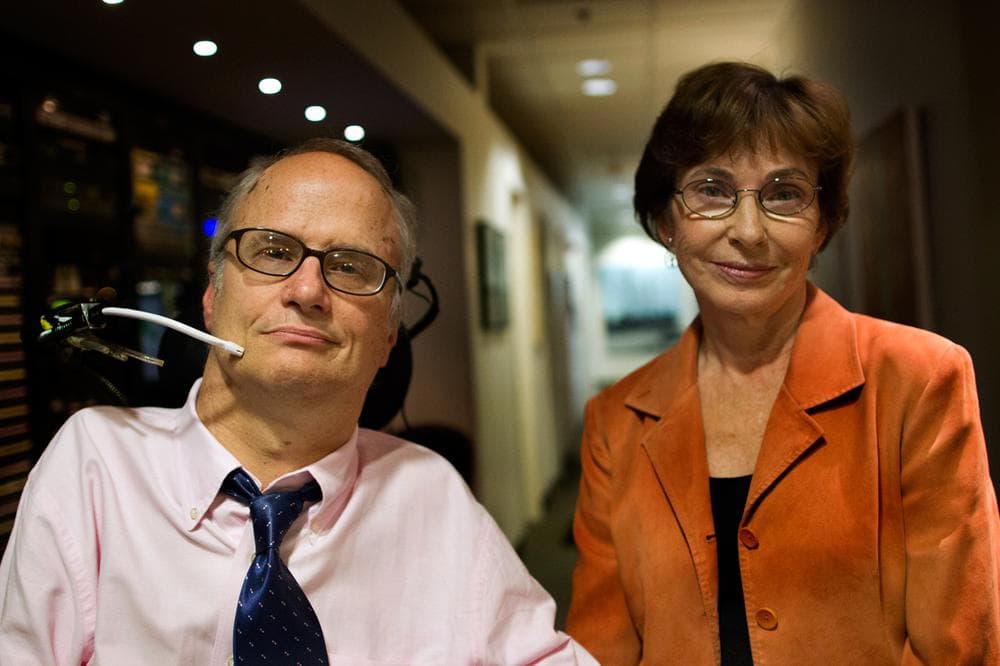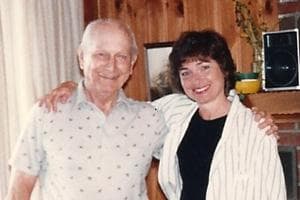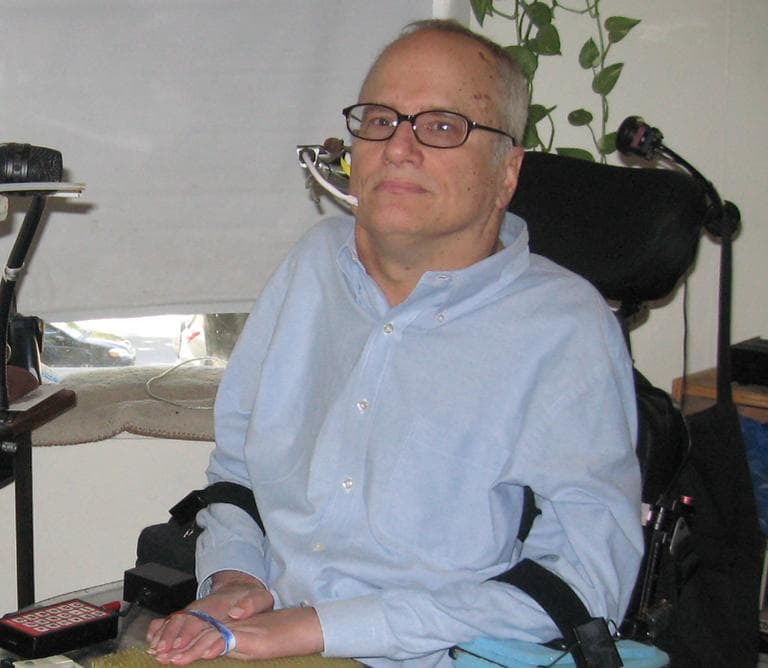Advertisement
On Doctor-Assisted Suicide, Stances Rooted In Intimate Experiences

This Election Day, Massachusetts voters will weigh in on the difficult issue of physician-assisted suicide. Specifically, whether terminally ill people expected to live six months or less should be able to get a lethal prescription from their doctors so they can end their lives on their own terms.
The main supporter and main opponent of this ballot question have appeared on WBUR in recent weeks to debate the merits of assisted suicide. Now, they speak with WBUR's All Things Considered host Sacha Pfeiffer about their very personal reasons for their stances.
First, Dr. Marcia Angell of Harvard Medical School. She led the effort to get the Death with Dignity initiative on the state ballot, although she doesn't like to call it assisted "suicide."
"I think there's a real need to drop the term 'suicide'," Angell said. "The typical suicide involves somebody with a normal life expectancy who chooses death over life. And in the case of assisted dying, the Death With Dignity Act, these people are already dying."
Angell began questioning how dying people are cared for when she was an intern at Mount Auburn Hospital in the 1960s. She says pain treatment then was "woefully inadequate," and she came to believe that terminally ill people should have more control.
"In those days you couldn't even ask to have life-sustaining treatment stopped," she recalled, "and so I saw patient after patient die very sad deaths."
She became convinced of the need for what she calls "assisted dying" two decades later, when her father, who had had prostate cancer for several years, did something drastic.
"He died in March of 1988. Starting the Christmas before, he began to have severe pain, had radiation for that, then had side effects from the radiation, then took pills for the side effects, for the nausea, then had side effects from the pills. And it was that downhill spiral," Angell recounted.
"He was walking to bed one night. He was walking with a walker by that time. And he stumbled and fell. My mom wasn't strong enough to lift him up and put him into bed, and so she called the EMTs, and they came and lifted him and put him into bed. And they said, 'We'll be back tomorrow morning and we'll take you to the hospital for X-rays to make sure you haven't broken anything.' So that night he took a pistol from his bedside table, where he had kept it all of my life. He believed in defending his family, and that's what that pistol was there for all of those years. But he took it out that night and he shot himself and died instantly."

Angell and her mother had no idea her father was considering suicide.
"I would have talked to him about it, I think, if I thought that he was immediately considering it," she said. "But that he would not have chosen to live under any circumstances, no matter how awful — I was aware of that. He would not have wanted to eke out every last day no matter how miserable it was."
Her father's sudden suicide had a different impact on her family than if he had died naturally from cancer or from a fatal prescription, Angell said.
"His last moments make me feel very sad. The loneliness, the courage he had to screw up to do it — I feel very sad about that," Angell said. "And I think if he had had assisted dying, and he could have had medication on his bedside instead of a pistol, and it was something that was legal and that was accepted and something that he could have spoken with my mom about, I think he would have lived longer. And I think it would have been much easier for the family.
"Having said that, the thought of my father suffering not only from the symptoms of dying — and pain, in a sense, is the easiest one to relieve — it's much harder to relieve symptoms like weakness, nausea, shortness of breath, loss of bodily functions, which is awful for a lot of people. They equate that with indignities. I think he would have considered that an awful thing, to die by inches over months."
It exasperates Angell that the main group opposing the ballot question says legalizing physician-assisted suicide could send the message that some lives are more worthwhile than others. That group, called Second Thoughts, is made up of people with disabilities and is led by John Kelly, a quadriplegic.
"This has nothing to do with disabled people, nothing whatsoever," Angell said. "This has to do with the terminally ill, which they are not. It's fine for them to take whatever position they want to. But they have no special standing. This is about terminally ill people who have a life expectancy of six months. It is not, 'Is your life worth living?' This is not about what he thinks or anybody thinks, except the patient."
Next, we speak with John Kelly, a disabilities rights activist and founder of Second Thoughts.
Kelly, the lead opponent of the ballot question, disagrees with Angell's argument that physician-assisted suicide is not a choice between life and death because terminally ill people are just choosing how to die.

"Marcia Angell makes this equation between having a terminal diagnosis and being dead," Kelly said. "It's as if the person is already in a separate category from life and all that matters is the manner of their death, when we see them as still living."
According to Kelly, he does have an intimate stake in physician-assisted suicide because he's severely disabled. And he says the life he lives is the kind of life this ballot question seems to suggest isn't worth living.
"I had a spinal cord injury 28 years ago in an accident, and I've used a wheelchair for mobility ever since," Kelly explained. "And I am paralyzed from the neck down, in the common parlance, which means I can use my shoulders and my head and my neck, and I drive my wheelchair with a sip-puff drive tube."
Kelly has many of the same physical problems as some terminally ill patients — problems that able-bodied people often describe as "indignities." But he isn't dying and he lives what he considers a full, relatively independent life. He's now 54 and heads Second Thoughts, an organization of people with disabilities who oppose legalized assisted suicide. He's against it, he said, even though there was a time after his accident when he wanted to end his life.
"And I actually thought about how I might be able to do it," Kelly recalled. "And I thought about the bus, and I thought no, that's too squishy. And I finally settled upon going over to the Fens, over there with the mighty creek called the Muddy River, and that I would back myself up and tip into the water, and then I would drown. And once I thought about that that way, I stopped thinking about it. I wanted to know that I could. And so I can understand people's desire for that control over their body."
Asked why he thinks other people shouldn't have help from the law in forming a so-called "exit plan," Kelly responded, "What I'm saying is that the state should not be approving of certain exit plans for certain reasons without paying attention to all the people that will be impacted in a negative way by this bill."
That would include people with illnesses or disabilities who feel that a physician-assisted suicide law would send the signal that their lives are not worthwhile, he said.
"And if you go see a doctor and that doctor starts talking about assisted suicide, that might feel like a radical betrayal," Kelly added. "I know it would for me."
As for physical limitations he has that other people describe as "indignities," Kelly said they include incontinence.
"I don't have willful control over my bladder or my bowels," he explained. "And as someone who was able-bodied, who became totally dependent on others for my physical care, it was incredibly difficult for me. But what was difficult was not the physical loss so much as my experience around the feeling of loss of control or of shame. And so we disabled people are here to say, 'You know, your physical condition is not related to your worth as an individual.' If you need someone else to help you with certain things, that's really OK. You had that when you were young, some of us have it all our lives, and then it comes back at the end of life.
"Everyone can make their own decision and refuse any treatment. But when the state says, 'For you people in this situation, it's dignified for you to kill yourself,' it undermines our suicide prevention efforts. People who are not as independent and in control and autonomous as the proponents of this bill are will be impacted."
Kelly said he isn't suggesting people should just tough it out.
"The problem is real. People suffer," he said. "I sympathize with people who are losing bodily control and can't get of bed. And it is hard. But this is not the way to solve it. I don't want to be portrayed as the evil naysayer who says buck up and take it. But we're concerned about everyone in society who might end up in a situation in which people around them think that they might be better off dead.
We want to say, 'Hey, we understand.' But let's try really good home care. Let's make sure that everyone gets early, full, good hospice so that we're not subjected to a radical lack of control with a bottle of pills at the end."

